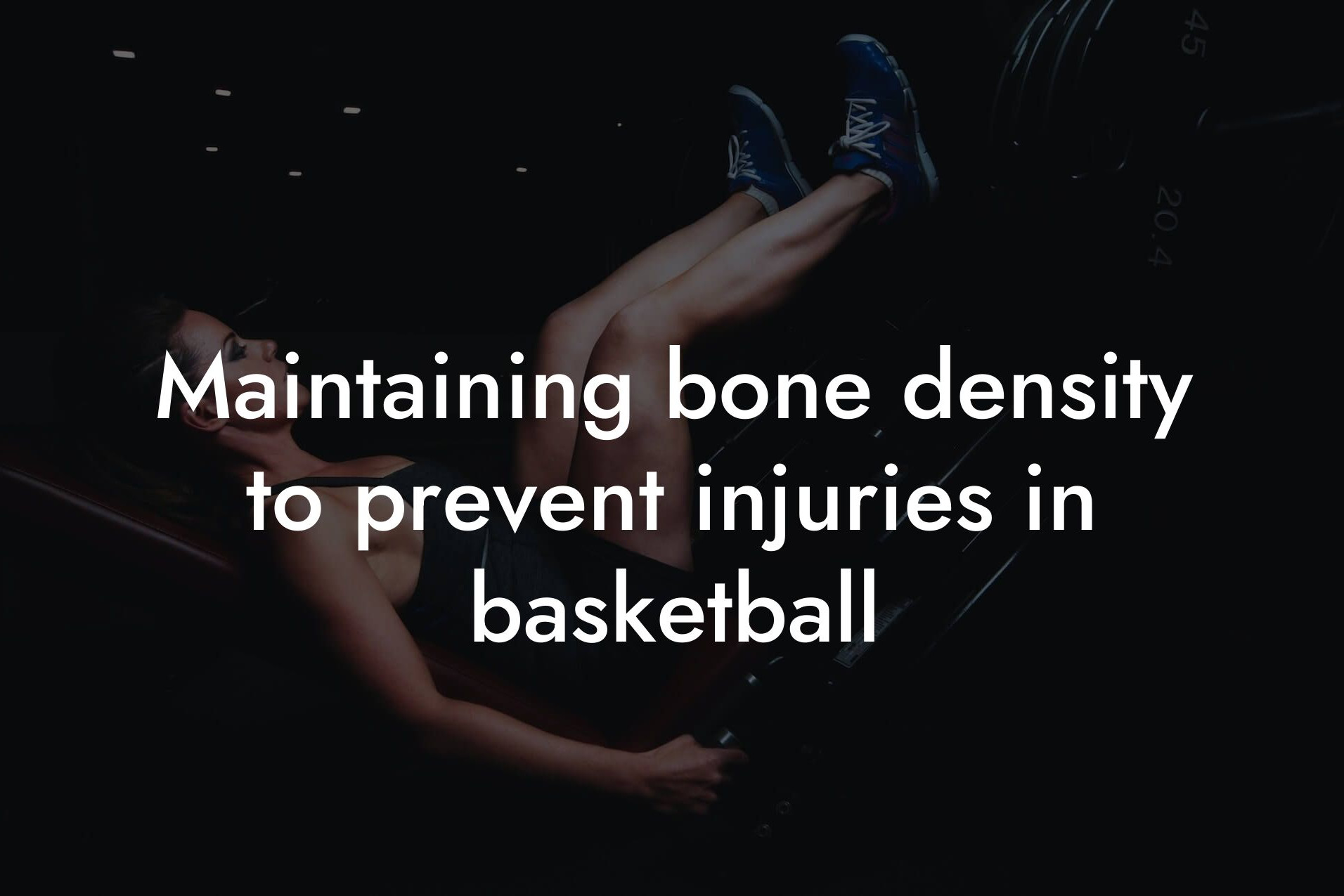As a high-earning professional, taking care of your physical health is crucial to performing at your best on and off the court. Basketball players, in particular, require a unique combination of strength, speed, agility, and endurance to excel in their sport. However, the physical demands of basketball can also take a toll on their bodies, making them prone to injuries and long-term health issues. This is where DEXA scans come in – a valuable tool for monitoring basketball player health and optimizing their performance.
Table of Contents
What is a DEXA Scan?
A DEXA (Dual-Energy X-ray Absorptiometry) scan is a non-invasive, low-radiation medical imaging test that measures bone density, body composition, and lean mass. It is commonly used to diagnose and monitor osteoporosis, but its applications extend far beyond bone health. In the context of basketball, DEXA scans provide a comprehensive picture of a player's overall health, allowing coaches, trainers, and medical professionals to identify areas for improvement and develop targeted training programs.
Benefits of DEXA Scans for Basketball Players
DEXA scans offer numerous benefits for basketball players, including:
• Accurate body composition analysis: DEXA scans provide a precise measurement of body fat percentage, lean mass, and bone density, helping players optimize their diet and training regimens for improved performance.
• Injury risk assessment: By identifying areas of low bone density or muscle imbalances, DEXA scans can help prevent injuries and reduce the risk of fractures, strains, and other common basketball-related injuries.
• Personalized training programs: DEXA scan data can be used to create customized training programs that address specific areas of improvement, such as increasing lean mass or improving bone density.
• Monitoring progress and tracking changes: Regular DEXA scans allow players to track changes in their body composition and bone density over time, helping them stay motivated and focused on their goals.
How DEXA Scans Can Help Prevent Injuries
Injuries are an unfortunate reality in basketball, but DEXA scans can help reduce the risk of certain injuries by identifying potential issues before they become major problems. For example:
• Stress fractures: DEXA scans can detect early signs of stress fractures, allowing players to take proactive measures to address the issue before it becomes a season-ending injury.
• Muscle imbalances: By identifying muscle imbalances, DEXA scans can help players correct these issues through targeted exercises and stretches, reducing the risk of strains and pulls.
• Overuse injuries: DEXA scans can help coaches and trainers identify players who are at risk of overuse injuries, allowing them to adjust practice schedules and training regimens accordingly.
What to Expect During a DEXA Scan
Getting a DEXA scan is a quick and painless process that typically takes around 10-15 minutes. Here's what you can expect:
• Preparation: Wear comfortable clothing and avoid wearing metal objects or jewelry that may interfere with the scan.
• The scan itself: Lie down on a flat table, and a DEXA machine will pass over your body, taking X-ray images of your bones and body composition.
• Results and analysis: A trained technician will analyze the scan results, providing you with a detailed report outlining your body composition, bone density, and lean mass.
Interpreting DEXA Scan Results
Understanding your DEXA scan results is crucial to making informed decisions about your training and nutrition. Here are some key metrics to focus on:
• Bone density: A measure of your bone health, with higher values indicating stronger bones.
• Body fat percentage: A measure of your overall body fat, with lower values indicating a leaner physique.
• Lean mass: A measure of your muscle mass, with higher values indicating greater muscle mass.
• Visceral fat area: A measure of your abdominal fat, with lower values indicating a lower risk of chronic diseases.
DEXA scans are a valuable tool for basketball players looking to optimize their performance, prevent injuries, and maintain long-term health. By providing a comprehensive picture of body composition, bone density, and lean mass, DEXA scans can help players make informed decisions about their training, nutrition, and recovery strategies. As a high-earning professional, investing in regular DEXA scans can be a game-changer for your career and overall well-being.
Get Started with Tano Performance Group
At Tano Performance Group, we understand the importance of using cutting-edge technology to help high-earning professionals like you achieve their fitness goals. Our state-of-the-art DEXA machine provides a complete body assessment, giving you the information you need to take your performance to the next level. Contact us today to schedule your appointment and start optimizing your health and performance.
Frequently Asked Questions
What is a DEXA scan and how does it work?
A DEXA (Dual-Energy X-ray Absorptiometry) scan is a non-invasive medical test that measures bone density, body composition, and fat distribution. It uses low-level X-rays to produce images of the body's internal structures, providing detailed information about bone density, lean mass, and fat mass.
Why are DEXA scans important for basketball players?
DEXA scans are essential for basketball players because they provide valuable insights into their overall health and performance. By monitoring bone density, body composition, and fat distribution, players can identify areas for improvement, optimize their training, and reduce the risk of injuries and illnesses.
How does a DEXA scan help with injury prevention?
A DEXA scan helps with injury prevention by identifying potential risk factors, such as low bone density, muscle imbalances, and poor body composition. This information allows players to take proactive steps to address these issues, reducing the likelihood of injuries and improving overall performance.
What can a DEXA scan reveal about a basketball player's body composition?
A DEXA scan provides detailed information about a player's body composition, including lean mass, fat mass, and body fat percentage. This information helps players optimize their nutrition and training programs, ensuring they have the ideal body composition for peak performance.
How does bone density affect a basketball player's performance?
Bone density plays a critical role in a basketball player's performance, as it affects their ability to withstand the physical demands of the sport. Low bone density can increase the risk of fractures and osteoporosis, while optimal bone density enhances power, speed, and agility.
Can a DEXA scan help with nutrition planning?
Yes, a DEXA scan can help with nutrition planning by providing information about a player's body composition and macronutrient needs. This information enables players to create personalized nutrition plans, ensuring they fuel their bodies for optimal performance.
How often should basketball players get a DEXA scan?
The frequency of DEXA scans depends on individual factors, such as training goals, injury history, and performance metrics. As a general rule, players should consider getting a DEXA scan every 6-12 months to monitor progress, identify areas for improvement, and adjust their training and nutrition programs accordingly.
What is the difference between a DEXA scan and a body fat scale?
A DEXA scan provides detailed information about body composition, including lean mass, fat mass, and bone density, whereas a body fat scale only measures body fat percentage. A DEXA scan is a more comprehensive and accurate tool for assessing body composition.
Can a DEXA scan help with weight management?
Yes, a DEXA scan can help with weight management by providing information about body composition and macronutrient needs. This information enables players to create personalized weight management plans, ensuring they achieve their goals while maintaining optimal body composition.
How does a DEXA scan help with athletic performance?
A DEXA scan helps with athletic performance by providing valuable insights into body composition, bone density, and muscle mass. This information enables players to optimize their training programs, improve power, speed, and agility, and gain a competitive edge.
Is a DEXA scan safe?
Yes, a DEXA scan is a safe and non-invasive medical test. It uses low-level X-rays, which are much safer than traditional X-rays, and does not require any injections, medications, or surgical procedures.
What is the cost of a DEXA scan?
The cost of a DEXA scan varies depending on the location, provider, and individual circumstances. On average, the cost of a DEXA scan ranges from $100 to $300.
How long does a DEXA scan take?
A DEXA scan typically takes around 10-15 minutes to complete, depending on the type of scan and the individual's body size.
What should I wear during a DEXA scan?
It's recommended to wear loose, comfortable clothing without metal fasteners or accessories, as these can interfere with the scan.
Can I eat or drink before a DEXA scan?
Yes, you can eat and drink as usual before a DEXA scan. However, it's recommended to avoid eating a large meal or consuming caffeine within 2-3 hours of the scan to ensure optimal results.
What happens during a DEXA scan?
During a DEXA scan, you will lie on a flat table, and the scanner will move slowly over your body, taking X-ray images of your internal structures. The process is painless and non-invasive.
How do I prepare for a DEXA scan?
To prepare for a DEXA scan, wear comfortable clothing, avoid eating a large meal or consuming caffeine, and remove any metal objects or accessories. It's also recommended to inform your healthcare provider about any medical conditions or implants that may affect the scan.
What are the benefits of regular DEXA scans for basketball players?
Regular DEXA scans provide basketball players with valuable insights into their body composition, bone density, and athletic performance. This information enables players to optimize their training and nutrition programs, reduce the risk of injuries, and gain a competitive edge.
Can a DEXA scan help with recovery from an injury?
Yes, a DEXA scan can help with recovery from an injury by providing information about bone density, muscle mass, and body composition. This information enables players to create personalized rehabilitation programs, ensuring they recover safely and effectively.
How does a DEXA scan compare to other body composition measurement tools?
A DEXA scan is a more accurate and comprehensive tool for measuring body composition compared to other methods, such as skinfold measurements, bioelectrical impedance analysis (BIA), or hydrostatic weighing.
Can a DEXA scan help with athletic career longevity?
Yes, a DEXA scan can help with athletic career longevity by providing valuable insights into body composition, bone density, and athletic performance. This information enables players to optimize their training and nutrition programs, reducing the risk of injuries and extending their athletic careers.
What are the limitations of a DEXA scan?
While a DEXA scan is a valuable tool, it has some limitations. For example, it may not provide accurate results for individuals with metal implants or those who are significantly overweight or underweight. Additionally, DEXA scans may not be suitable for pregnant women or individuals with certain medical conditions.
How can I find a qualified healthcare provider to administer a DEXA scan?
You can find a qualified healthcare provider to administer a DEXA scan by asking for referrals from your primary care physician, searching online, or contacting professional organizations, such as the International Society for Clinical Densitometry (ISCD).
What should I do if I have concerns or questions about my DEXA scan results?
If you have concerns or questions about your DEXA scan results, it's recommended to discuss them with your healthcare provider or a qualified healthcare professional. They can provide personalized guidance and recommendations based on your results.
Here are some related articles you might love...
- Maintaining bone density to prevent injuries in basketball
- Strength and conditioning programs for basketball players
- How to optimize endurance for long basketball seasons
- The importance of hydration and nutrition in basketball
- How body composition impacts vertical leap in basketball
- Off-season training for professional basketball players
- The impact of muscle mass on basketball agility and speed
- Reducing body fat for optimal basketball performance
- Nutrition tips for sustaining energy during basketball games
Zak Faulkner
Zak Faulkner is a leading authority in the realm of physical health and body composition analysis, with over 15 years of experience helping professionals optimise their fitness and well-being. As one the experts behind Tano Performance Group, Zak has dedicated his career to providing in-depth, science-backed insights that empower clients to elevate their physical performance and overall health.
With extensive knowledge of DEXA technology, Zak specializes in delivering comprehensive body assessments that offer precise data on body fat, muscle mass, bone density, and overall physique. His expertise enables individuals to make informed decisions and achieve their fitness goals with accuracy and confidence. Zak’s approach is rooted in a deep understanding of human physiology, combined with a passion for helping clients unlock their full potential through personalised strategies.
Over the years, Zak has earned a reputation for his commitment to excellence, precision, and client-focused service. His guidance is trusted by top professionals who demand the best when it comes to their health. Whether advising on fitness programs, nutritional strategies, or long-term wellness plans, Zak Faulkner’s insights are a valuable resource for anyone serious about taking their health and fitness to the next level.
At Tano Performance Group, Zak continues to lead our Content Team revolutionising how professionals approach their physical health, offering unparalleled expertise that drives real results.




